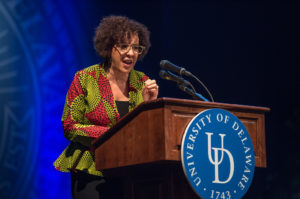Digital Humanities Pedagogy Lunch with Dr. Gabrielle Foreman
 Professor Foreman is the founding faculty director of the Colored Conventions Project, which since 2012 has made digitally available six decades of Black political organizing that overlapped with and was obscured by the abolitionist movement. The project has involved over 1000 students across the country in undergraduate research through its curriculum adopted by the Project’s national teaching partners while launching a transcription project recognized alongside those by the British Library and the Massachusetts Historical Society. She has also published extensively on race, slavery, and reform in the nineteenth century, creatively utilizing media to reach millions with her scholarly work. She has been a Kellogg National Leadership Program fellow, is currently a Ford Foundation Fellow, and co-founded Action for Social Change and Youth Empowerment, which provided in-depth training to cohorts of young people who then took seats on the Boards of Directors of leading and state-wide organizations.
Professor Foreman is the founding faculty director of the Colored Conventions Project, which since 2012 has made digitally available six decades of Black political organizing that overlapped with and was obscured by the abolitionist movement. The project has involved over 1000 students across the country in undergraduate research through its curriculum adopted by the Project’s national teaching partners while launching a transcription project recognized alongside those by the British Library and the Massachusetts Historical Society. She has also published extensively on race, slavery, and reform in the nineteenth century, creatively utilizing media to reach millions with her scholarly work. She has been a Kellogg National Leadership Program fellow, is currently a Ford Foundation Fellow, and co-founded Action for Social Change and Youth Empowerment, which provided in-depth training to cohorts of young people who then took seats on the Boards of Directors of leading and state-wide organizations.
Topics for discussion at the Digital Pedagogy Lunch include: thoughts about digital pedagogy from the founders of HASTAC, “CCP in a box” – teaching protocols developed in concert with the Colored Conventions Project, and methods for opening projects to digital innovation more broadly. Time will be reserved for open conversation.
Date: Monday, February 27th, 2017
Time: 11:15am – 12:15pm
Location: Center for Digital Humanities, 344 Buttrick Hall
Open to the Vanderbilt community. Registration required.
The Conversations on Digital Pedagogy series is co-sponsored by the Center for Digital Humanities, the Center for Teaching, and the Vanderbilt Institute for Digital Learning. This session also connects to other events tied with Dr. Foreman’s visit, which is sponsored by The Center for Digital Humanities, Voices from Our America, The Curb Center, The Program in American Studies, The Bishop Joseph Johnson Black Cultural Center, and the English Graduate Students Association. For more information, please visit the Center for Digital Humanities website.

Leave a Response